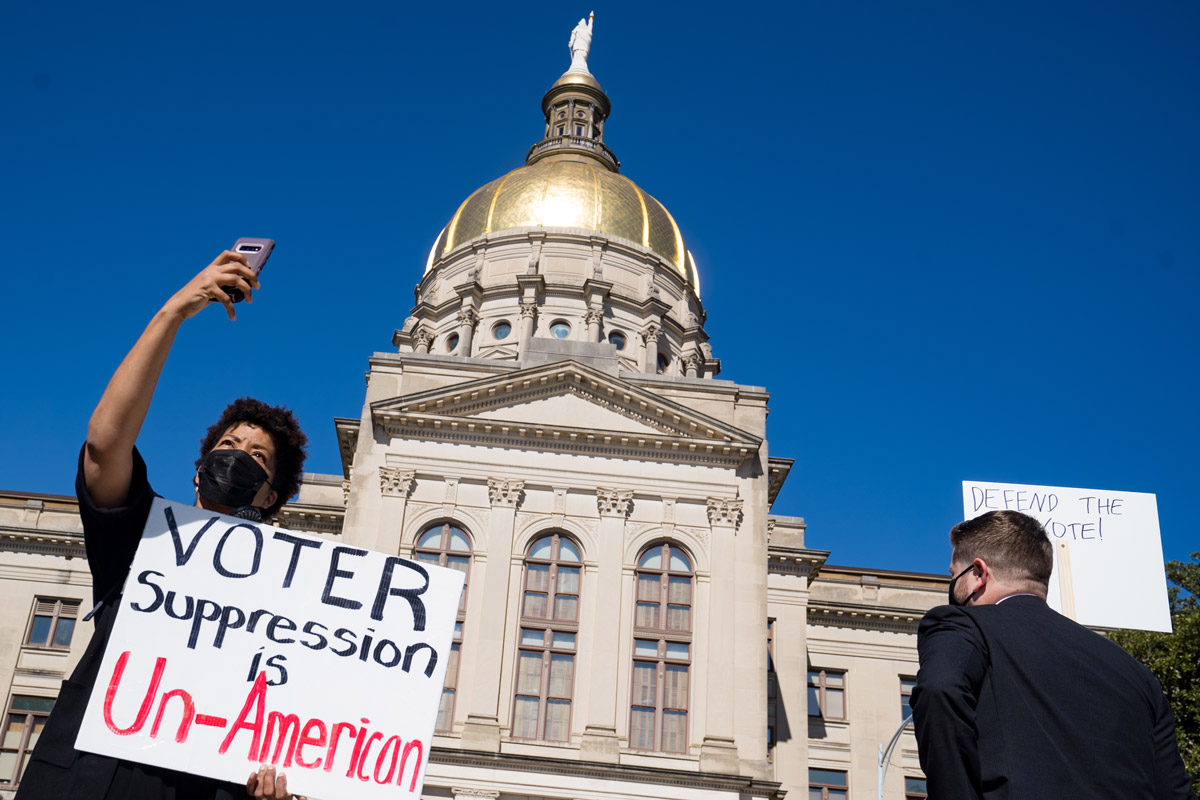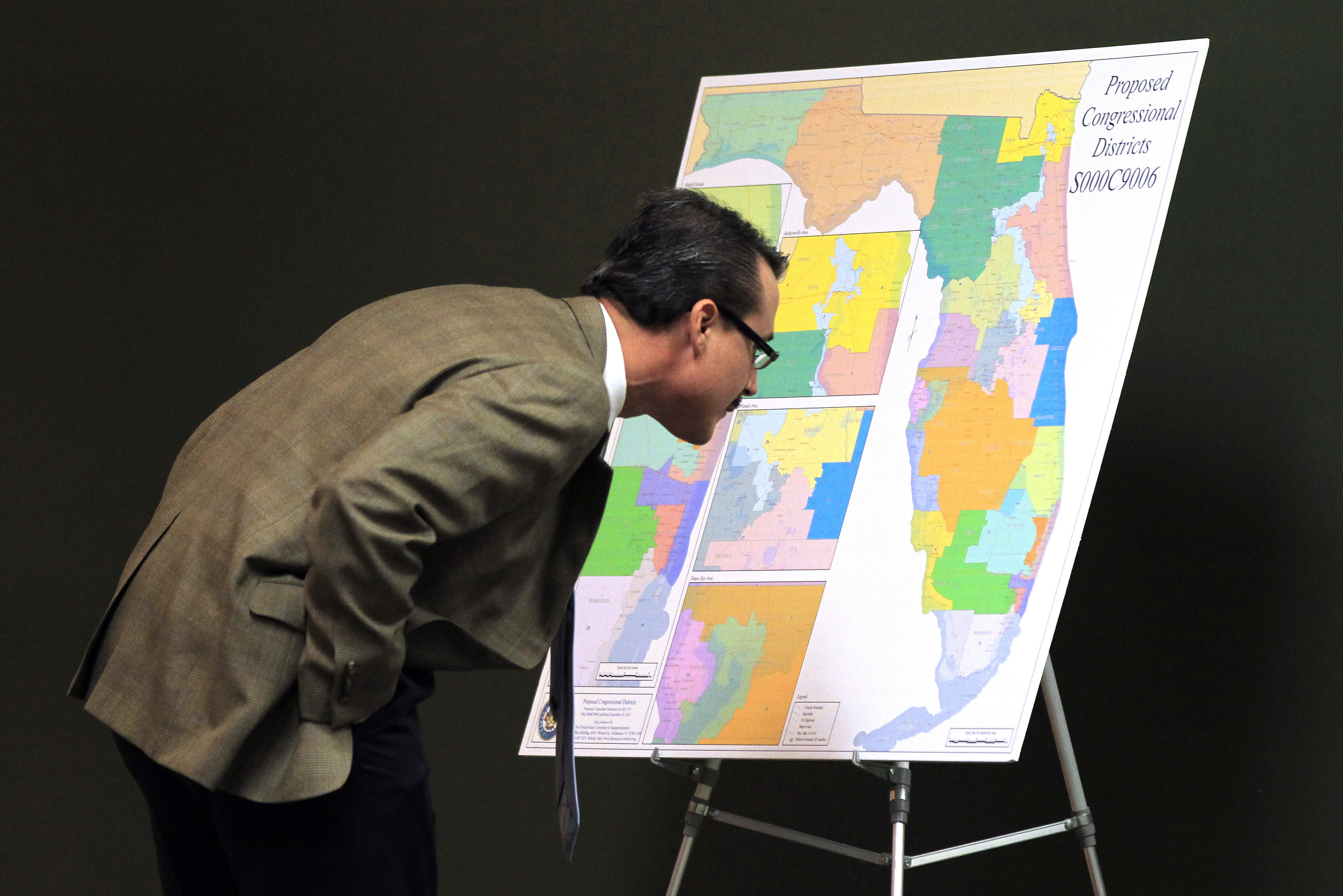In the War Against Voter Suppression, Corporate Pressure is Not a Silver Bullet
By Abe Nelson
Last month, hundreds of American companies and executives released a statement opposing “any discriminatory legislation†that would make it harder for people to vote. The move was a notable condemnation of an onslaught of bills introduced by Republicans in nearly every state across the country that would disproportionately disenfranchise people of color and members of other marginalized groups. Businesses ranging from Amazon to General Motors can wield significant financial pressure to oppose policymakers attempting to implement what voting rights activists call “Jim Crow in a Tuxedo.†Corporations can divest from states that pass voter suppression laws, withhold donations from elected officials that support such laws, and move events in response to legislation as Major League Baseball did when it moved its All Star Game from Atlanta to protest Georgia’s restrictive SB 202 law.
However, while corporate opposition to suppressive voting policies is a powerful and legal advocacy tool, voting rights activists should not solely rely on the private sector as they struggle against laws being pushed in response to the ‘Big Lie’ that the 2020 election was illegitimate. Ultimately, rolling back voter suppression will require a host of responsive tactics beyond corporate pressure.
To be clear, it is important that companies are speaking out against voter suppression. Specifically, their opposition can highlight how suppressive laws are based on a lie and create a racist web of policies that disproportionately block people of color from voting.
Policymakers that implement suppressive laws argue their actions are necessary to uphold election integrity and to prevent fraud. However, a review of the facts reveals the absurdity of this claim and extensive research shows that voter fraud is “vanishingly rare.†So rare, in fact, that even a commission that then-President Trump convened to uncover evidence of voter fraud in the 2016 election was disbanded when it failed to find any such evidence. Instead, suppressive laws impact students, the elderly, people with disabilities, and people of color. For example, the ACLU reports that counties with larger minority populations have fewer polling sites per voter, and disenfranchisement laws prevent 1 in 13 Black Americans nationally from voting. Moreover, many of the Republican-backed bills in 2021 state legislative sessions target voting methods favored by Democratic voters in the 2020 election. For example, Georgia’s recently-signed SB 202 will cut the absentee ballot request window in half after two-thirds of the state’s 1.3 million mail-in ballots went for President Biden.
It bears repeating that the rationale Republican leaders use to advance ‘election integrity’ is false. Former officials in the Trump Administration, including then-Attorney General Bill Barr, concluded that the 2020 election was legitimate. Similarly, governors in states pursuing suppressive policies, such as Florida, concede that their election was smooth while Texas Governor Abbott recently admitted he is unaware of “any” voter fraud that occurred in Texas in 2020. Despite these facts, Florida Republicans passed SB 90 that will limit absentee voting and ballot drop boxes (both methods Florida Democrats favored in 2020) while Texas Republicans are pursuing bills that will make voting harder in the state’s diverse, Democratic-leaing cities. As a spokesperson for the ACLU of Florida summarized, “Everything worked as it should. The only reason they’re doing this is to make it harder to vote.â€
Given that election integrity is clearly not the motivation behind suppressive laws, corporate pressure may convince some state lawmakers to soften or block some restrictive bills. A recent study showed that passing restrictive laws in Texas could cost the state tens of thousands of jobs. Such threats may convince a critical number of elected officials that addressing a nonexistent problem is not worth sacrificing their constituents’ jobs or alienating their own corporate donors.
Unfortunately, corporate backlash alone cannot prevent voter suppression. Fear of financial repercussions may have contributed to Florida Republicans striking egregious provisions from SB 90, like a proposal to ban ballot dropboxes, but most of the heavily-restrictive bill still passed. Moreover, economic sanctions may have unintended consequences. Voting rights leaders like Stacey Abrams have cautioned against boycotts because they could cause job losses that harm the very people corporations want to help. Furthermore, there is no guarantee that businesses will maintain their principled stance. Following the Capitol Insurrection on January 6, 2021, many prominent businesses halted donations to representatives who refused to certify the 2020 election result and at least three Fortune 500 companies violated their pledge by April 2021. Effectively, fear of political backlash stemming from being labeled a ‘woke corporation’ may eventually cause the private sector to back away from this contentious issue.
Finally, corporate pressure may be unable to overcome re-election seeking behavior. Former President Trump’s persistent claims that the 2020 election was stolen, mixed with his continued popularity amongst Republican voters, suggests that Republican politicians stand to gain politically by advancing legislation that pleases Mr. Trump. This explains the intransigence of Republicans like Texas Governor Abbott, who told companies to, “stay out of politics†(no word on whether he plans to return any of the $1 million his campaign received primarily from corporate donations in 2020).
Corporate pressure is an important tool, not a silver bullet. Creating a truly inclusive democracy will require responsive state-level organizing that mobilizes citizens to fight back against discriminatory policies. Specifically, voting rights advocates should electorally target legislators that supported suppressive bills in 2021. Even if redistricting and suppressive laws disenfranchise some Democratic-leaning voters, Republicans in a number of states pursuing new restrictions may be electorally vulnerable in 2022. For example, Texas Democrats were only 23,000 total votes from flipping the Texas House of Representatives in their favor in 2020. Meanwhile, a majority of Texas voters support expanding voter access with policies like automatic voter registration and online voter registration. Standing against popular, commonsense policies may alienate swing voters needed to win tightly contested districts.
This battle will extend beyond the 2022 midterms. Corporate pressure can be part of passing voter access laws. However, progress will also take the vast voter mobilization efforts from grassroots organizers and national groups, litigation, and, eventually, federal legislation that massively expands voter access, like HR 1. Success can be built on messaging that reminds impacted voters that they are targeted by new laws, often explicitly because of their race or ethnicity. For example, despite impressive Republican gains with Latino voters in South Texas in 2020, the Texas GOP is doubling down on politics that emphsaize fears of undocumented people voting, not caring that these arguments have a dangerous nexus to white nationlist rhetoric that inspired the murder of 22 Latino people in El Paso in 2018.
Momentum is growing. Commentators are pointing out that disenfranchisement could backfire on vulnerable Republicans by galvanizing voters from marginalized groups to turnout against them. To be sure, suppressive bills should be opposed because they are racist and erode democracy, not because they may yield a political windfall. That said, this political self-harm may prove to be more lasting than any corporate statements on voting rights.
Author

Abe Nelson is a second-year MPA-PNP student at NYU Wagner and the Spring 2021 Bloomberg Fellow at the NYU Furman Center. At Wagner, he has previously worked as a research assistant on the Furman Center’s data team and as a graduate student intern with the ACLU’s National Political Advocacy Department. In addition, he is a staff writer for NYU Wagner Review and a former Co-Director of NYU Vote 2020. Prior to enrolling at Wagner Abe worked as a program associate in the NYC Mayor’s Office of Criminal Justice. He holds a B.A. in Political Science from Kenyon College.
Photo Credit: Megan Varner/Getty Images




